KDTree 概念
头文件
#include <iostream>
#include <cstdio>
#include <cstring>
#include <cstdlib>
#include <algorithm>
#include <queue>
#include <vector>
#include <stack>
#include <map>
#include <set>
#include <sstream>
#include <iomanip>
#include <cmath>
#include <bitset>
#include <assert.h>
using namespace std;
typedef long long ll;
typedef set<int>::iterator ssii;
#define Cmp(a, b) memcmp(a, b, sizeof(b))
#define Cpy(a, b) memcpy(a, b, sizeof(a))
#define Set(a, v) memset(a, v, sizeof(a))
#define debug(x) cout << #x << ": " << x << endl
#define _forS(i, l, r) for(set<int>::iterator i = (l); i != (r); i++)
#define _rep(i, l, r) for(int i = (l); i <= (r); i++)
#define _for(i, l, r) for(int i = (l); i < (r); i++)
#define _forDown(i, l, r) for(int i = (l); i >= r; i--)
#define debug_(ch, i) printf(#ch"[%d]: %d\n", i, ch[i])
#define debug_m(mp, p) printf(#mp"[%d]: %d\n", p->first, p->second)
#define debugS(str) cout << "dbg: " << str << endl;
#define debugArr(arr, x, y) _for(i, 0, x) { _for(j, 0, y) printf("%c", arr[i][j]); printf("\n"); }
#define _forPlus(i, l, d, r) for(int i = (l); i + d < (r); i++)
#define lowbit(i) (i & (-i))
#define MPR(a, b) make_pair(a, b)
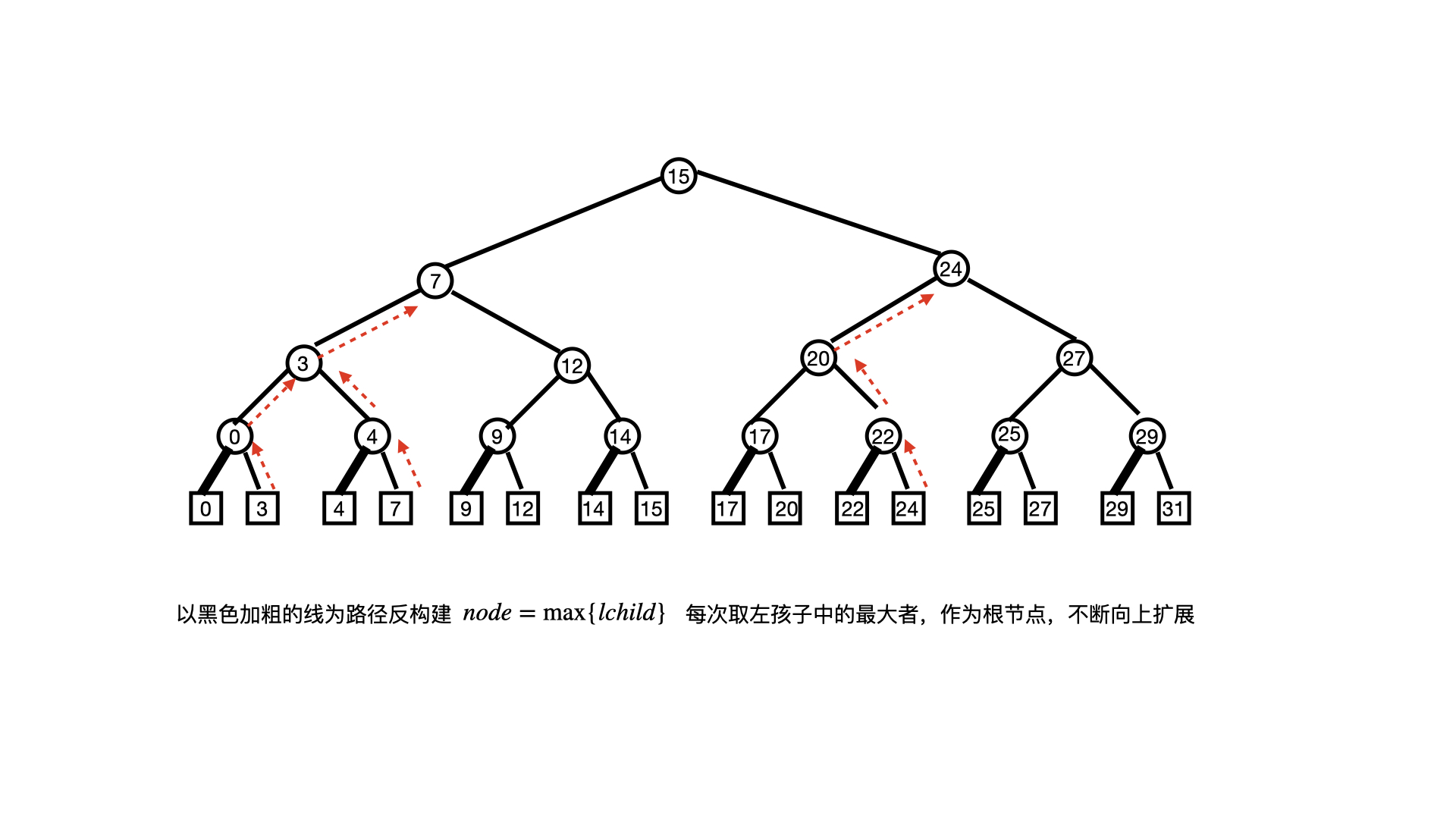
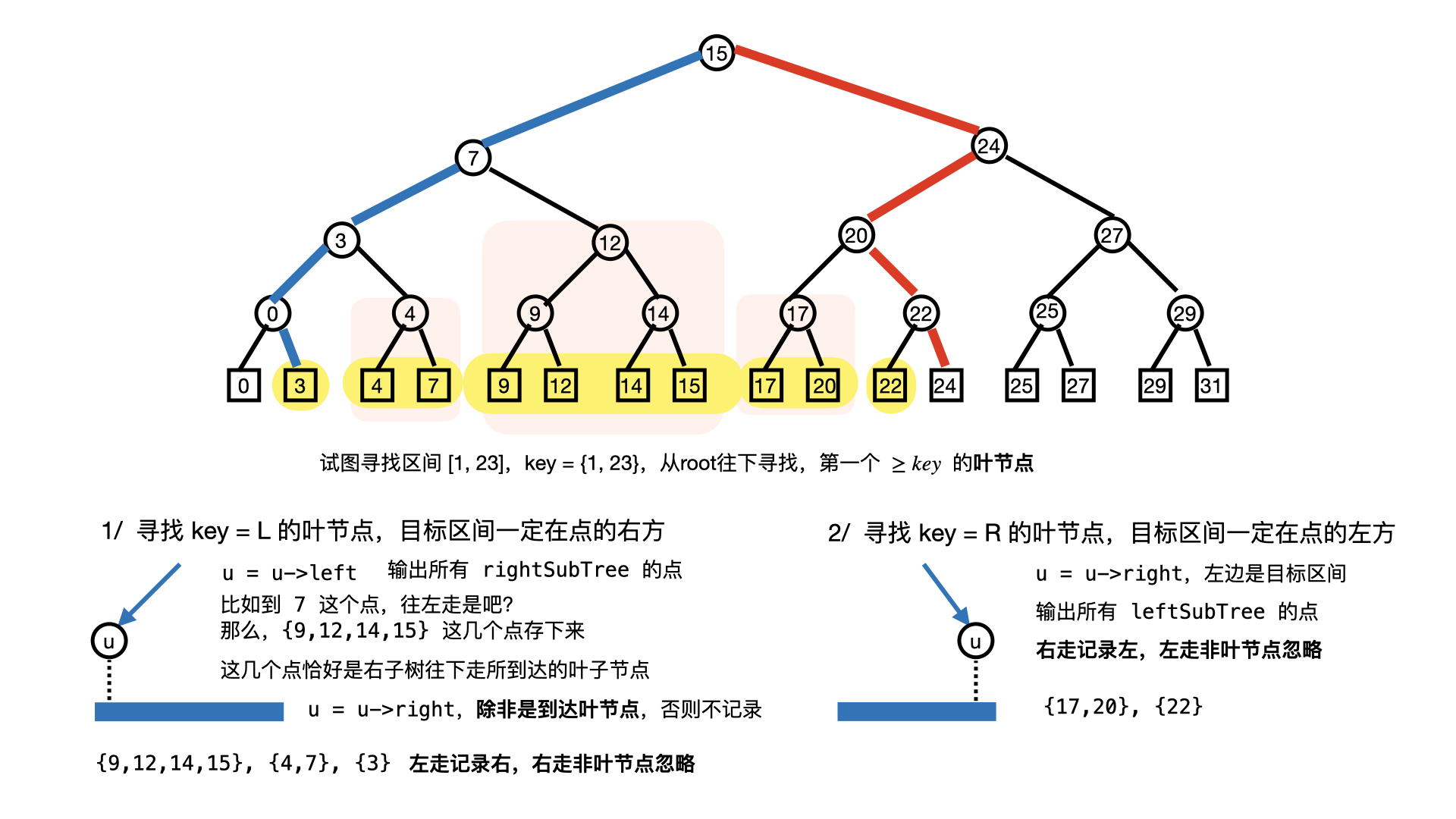
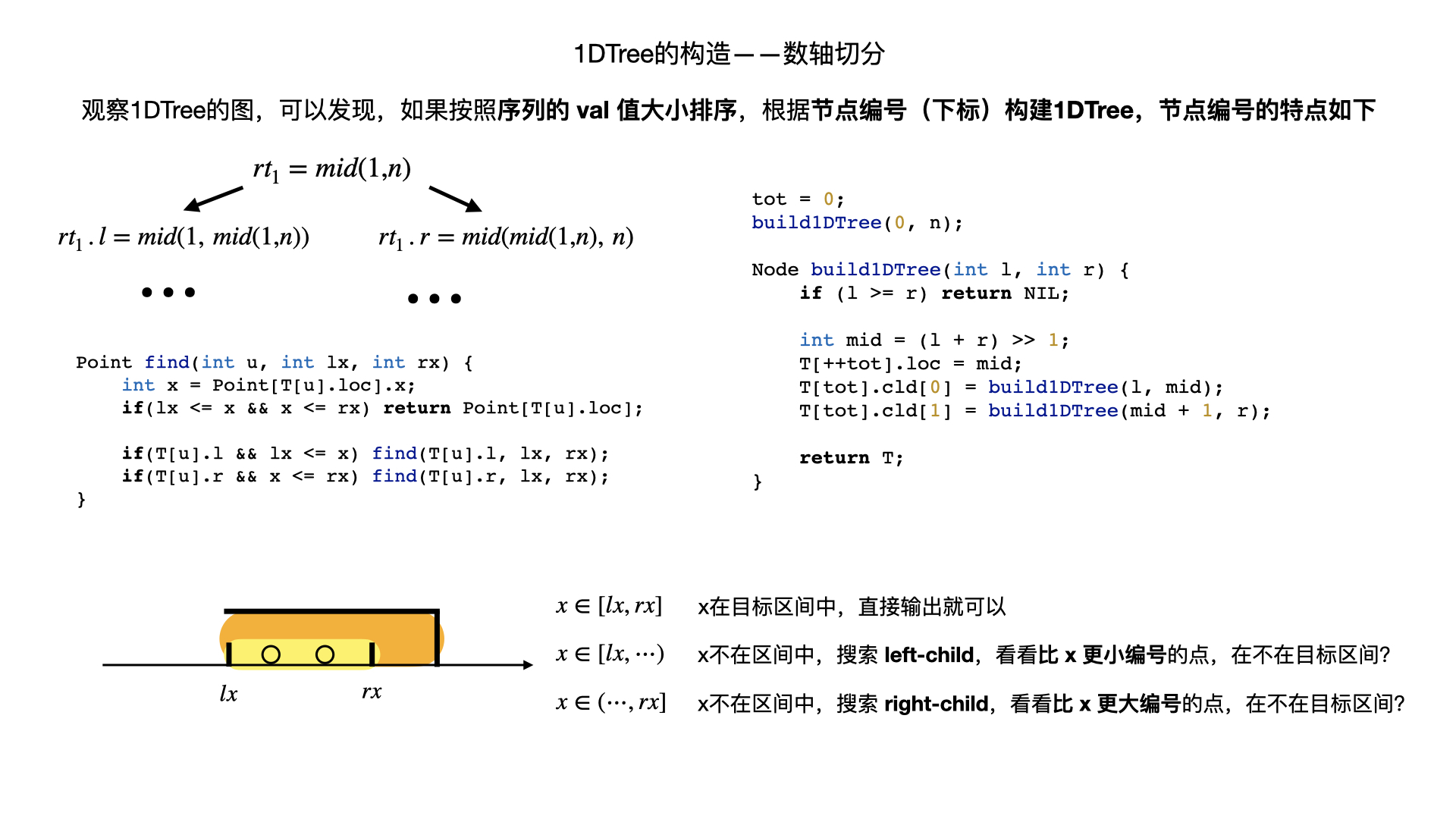
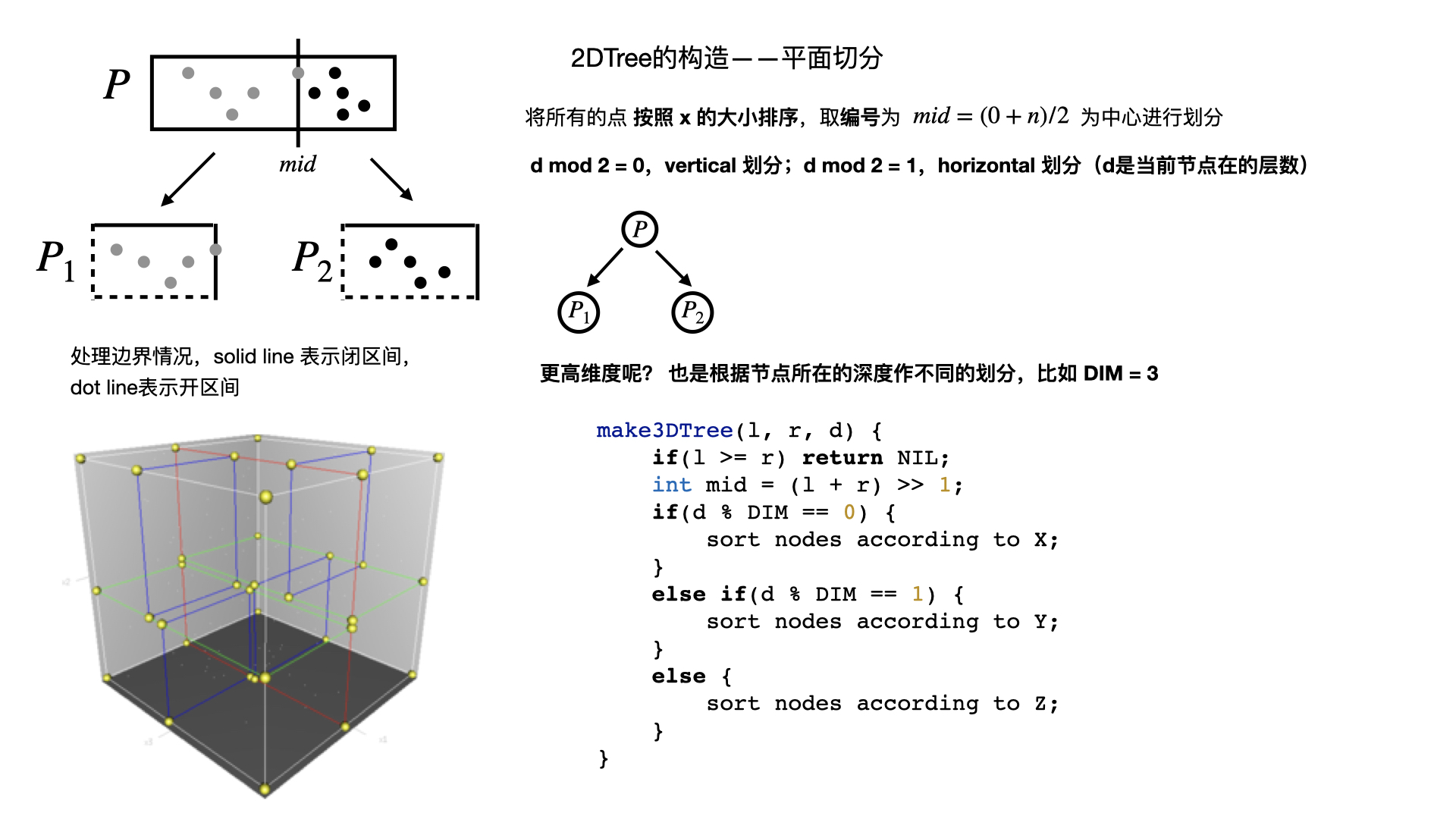
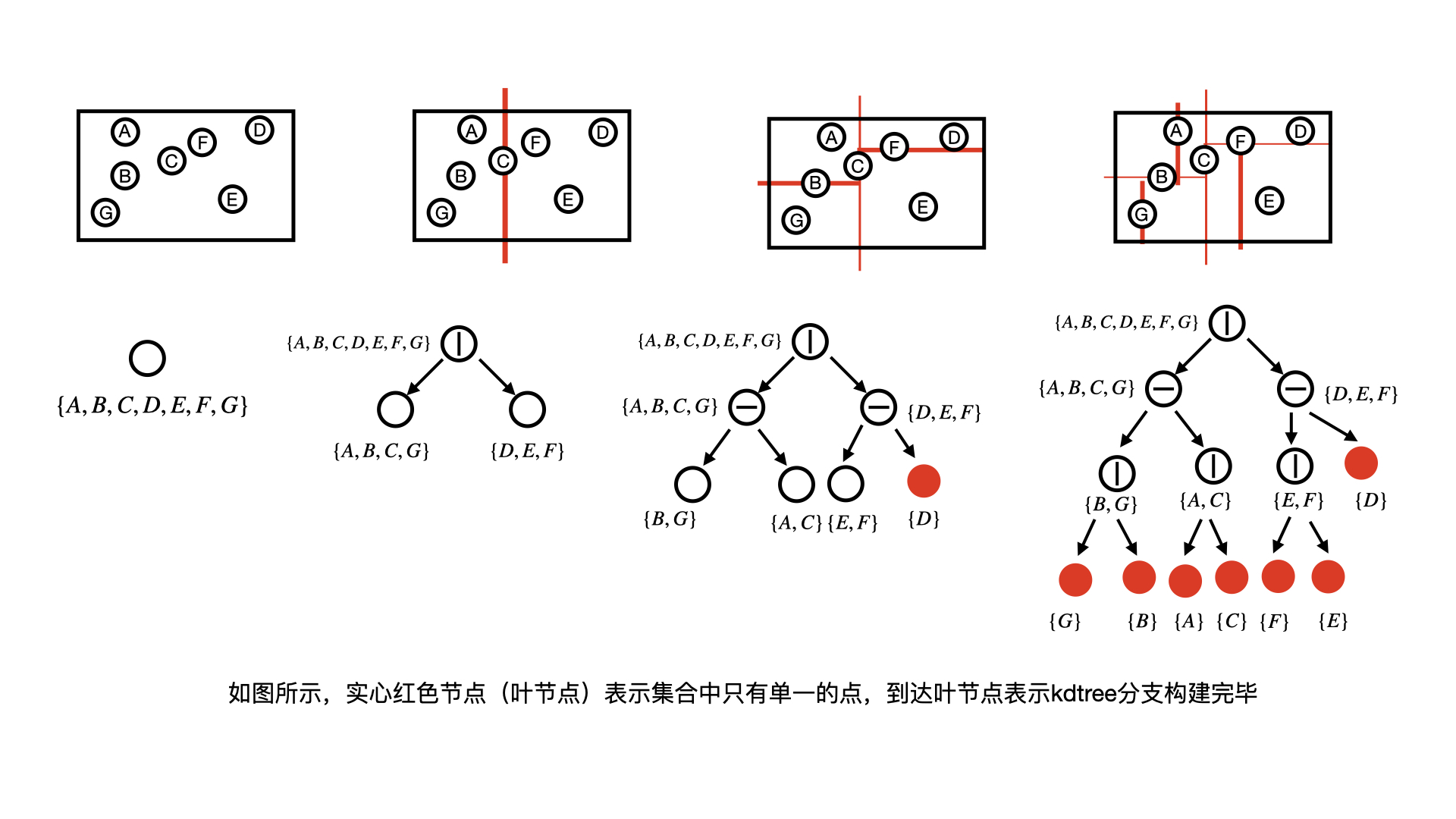
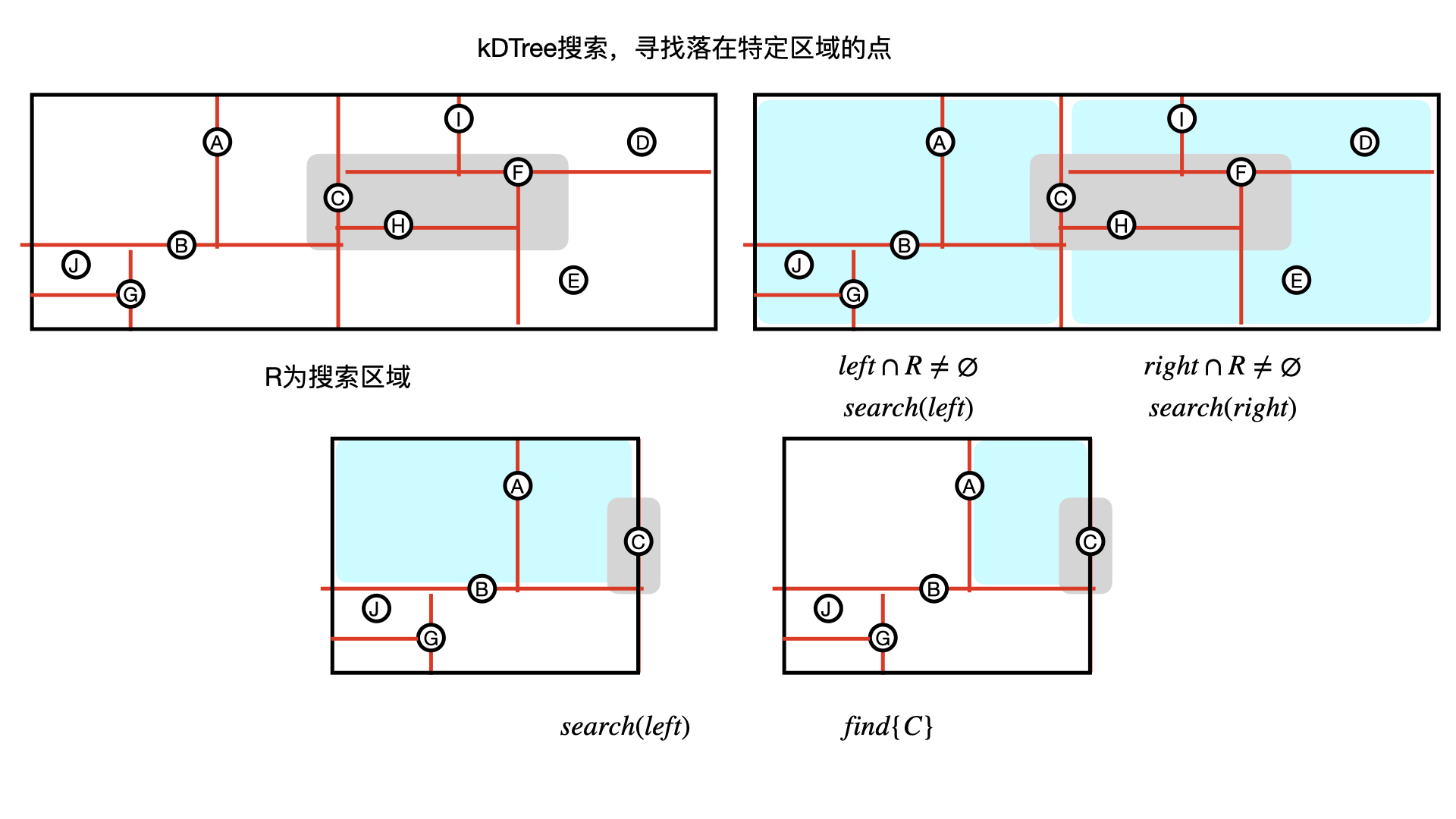
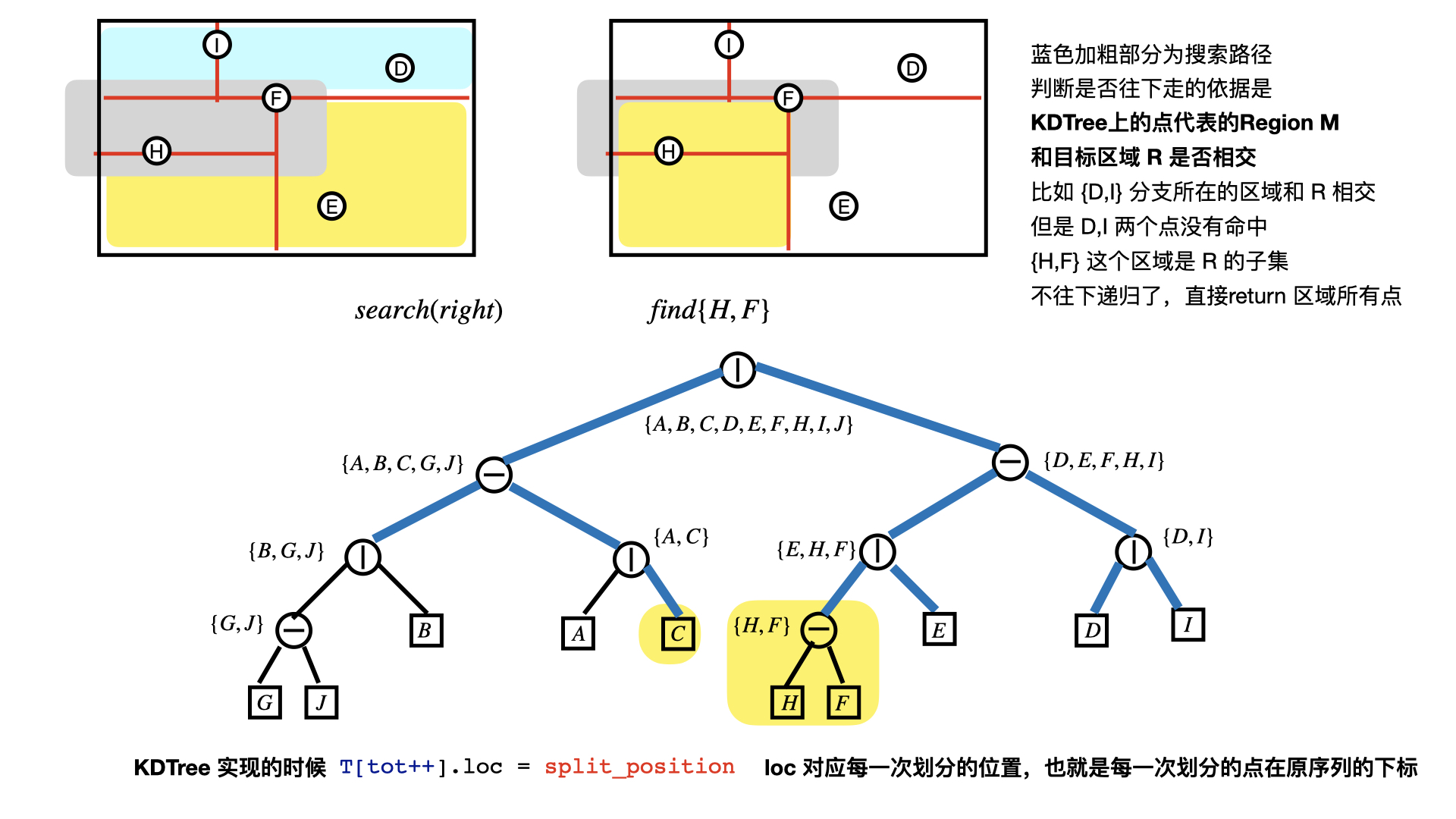
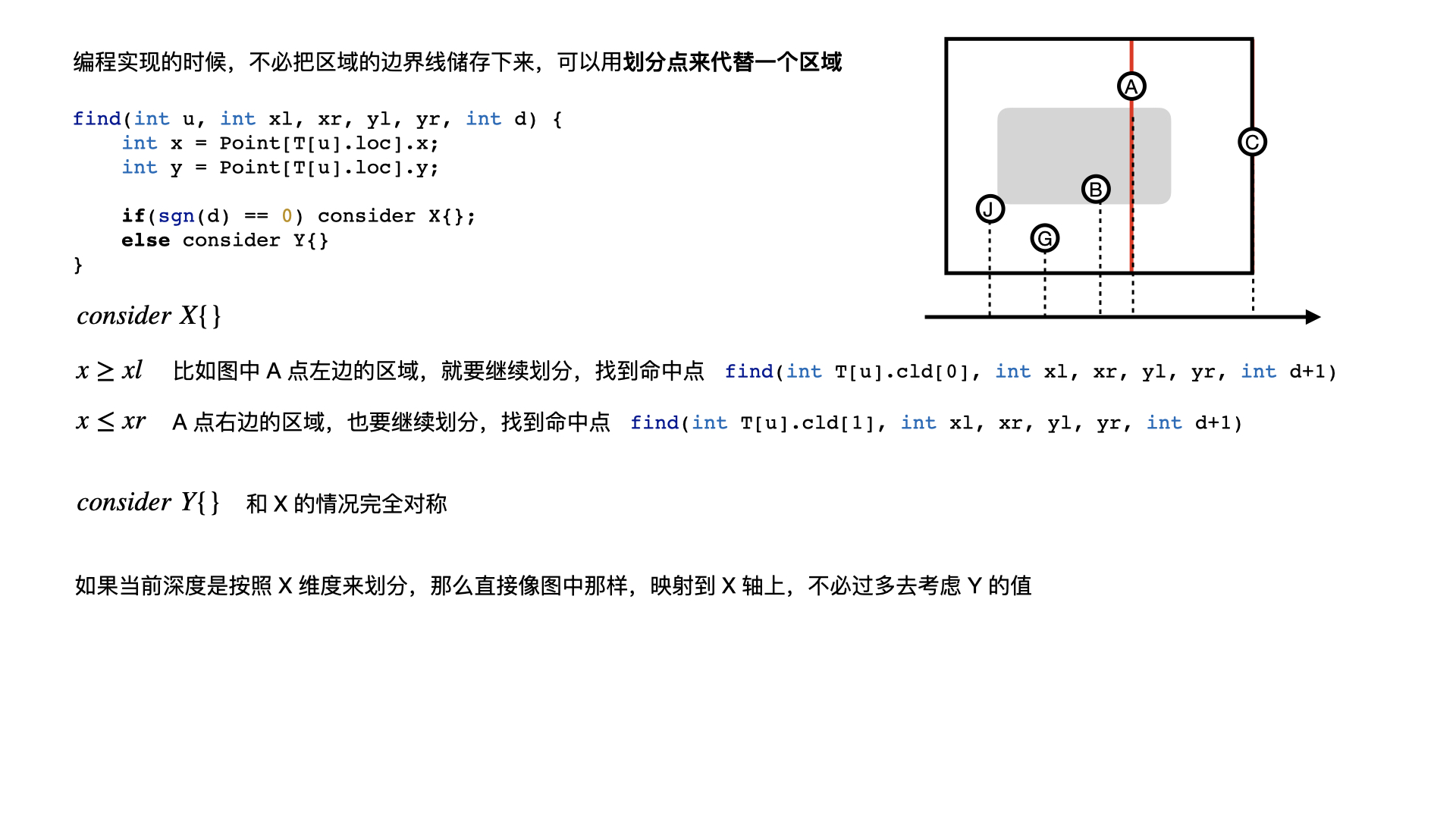
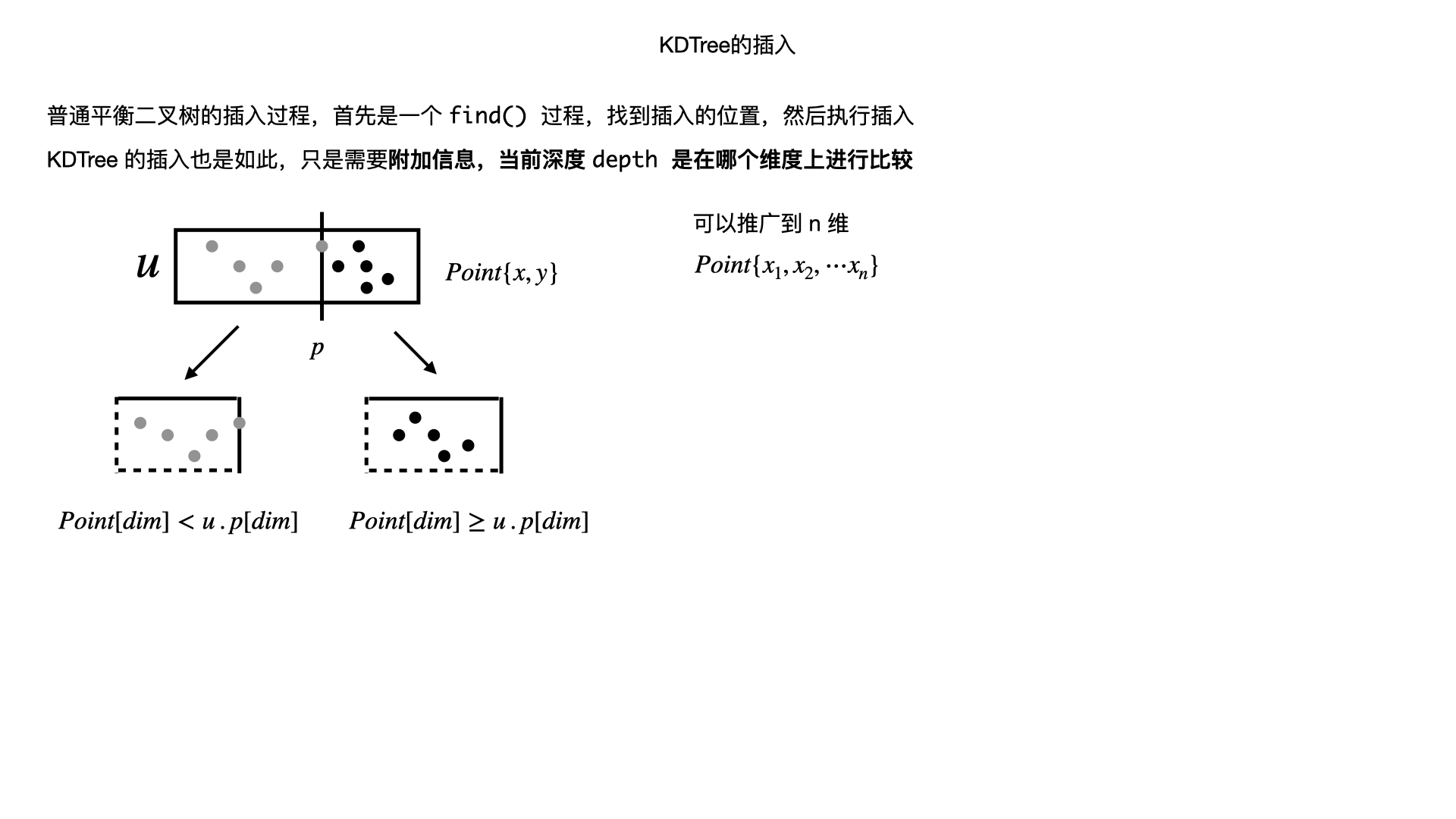
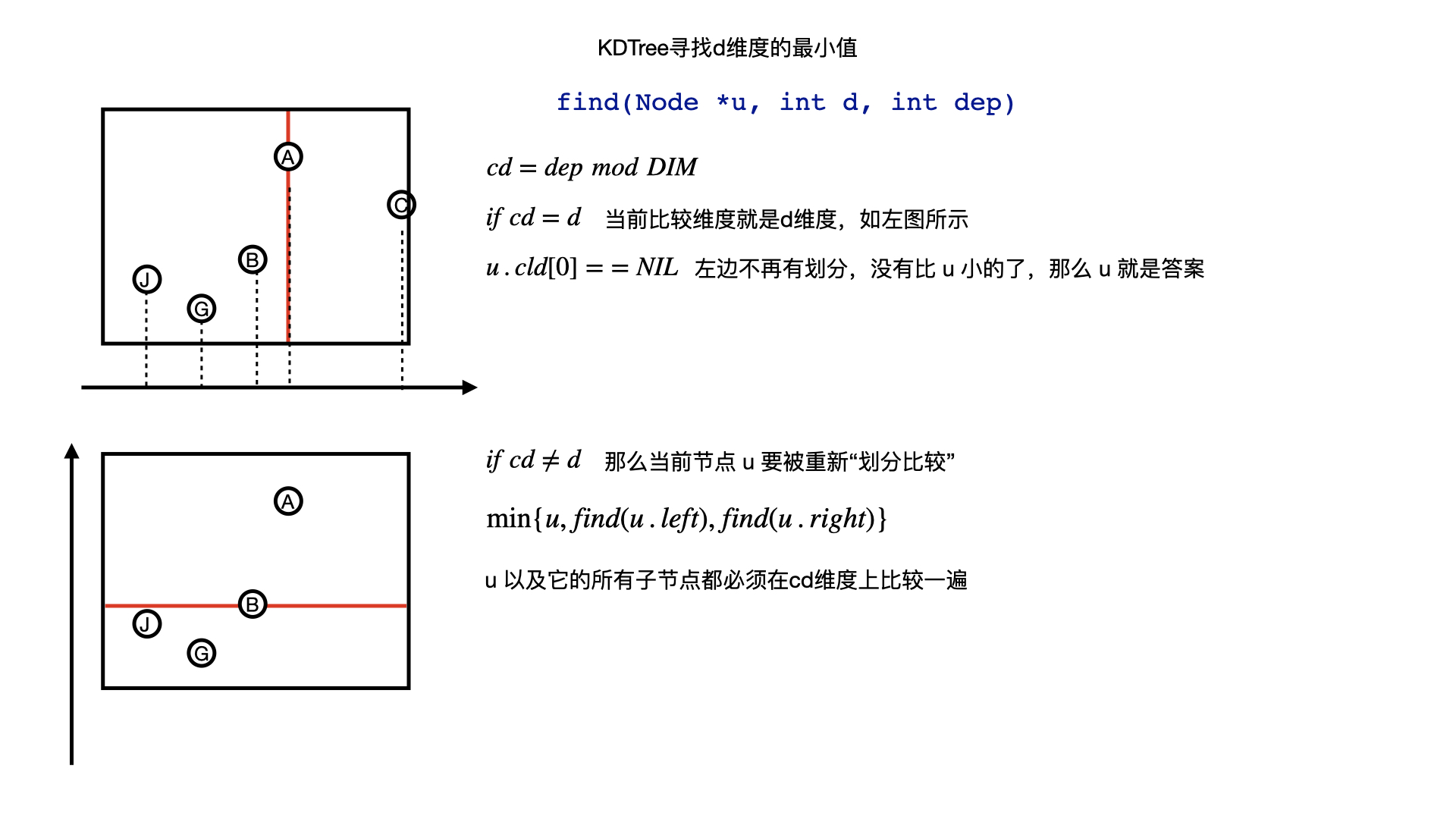
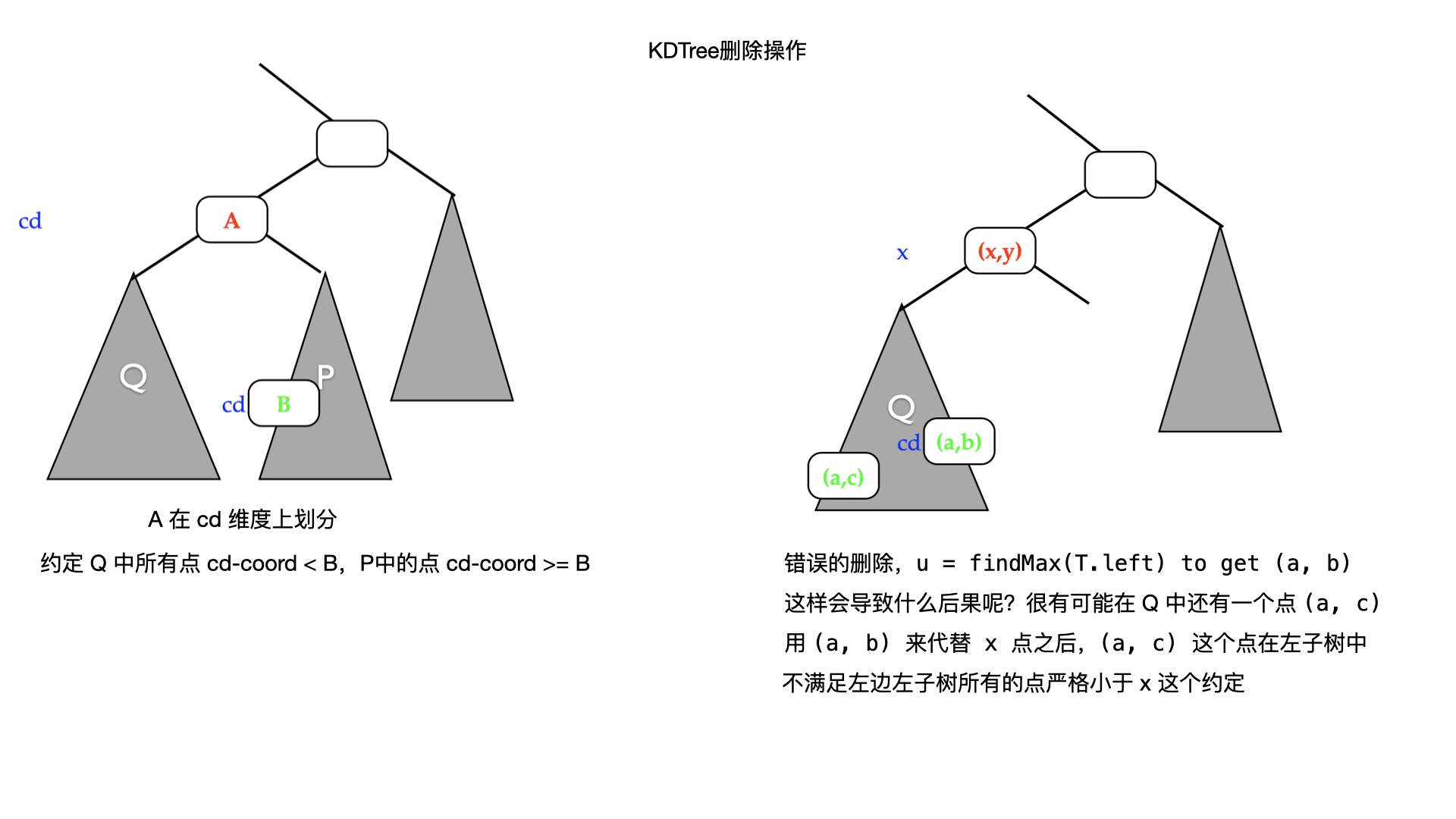
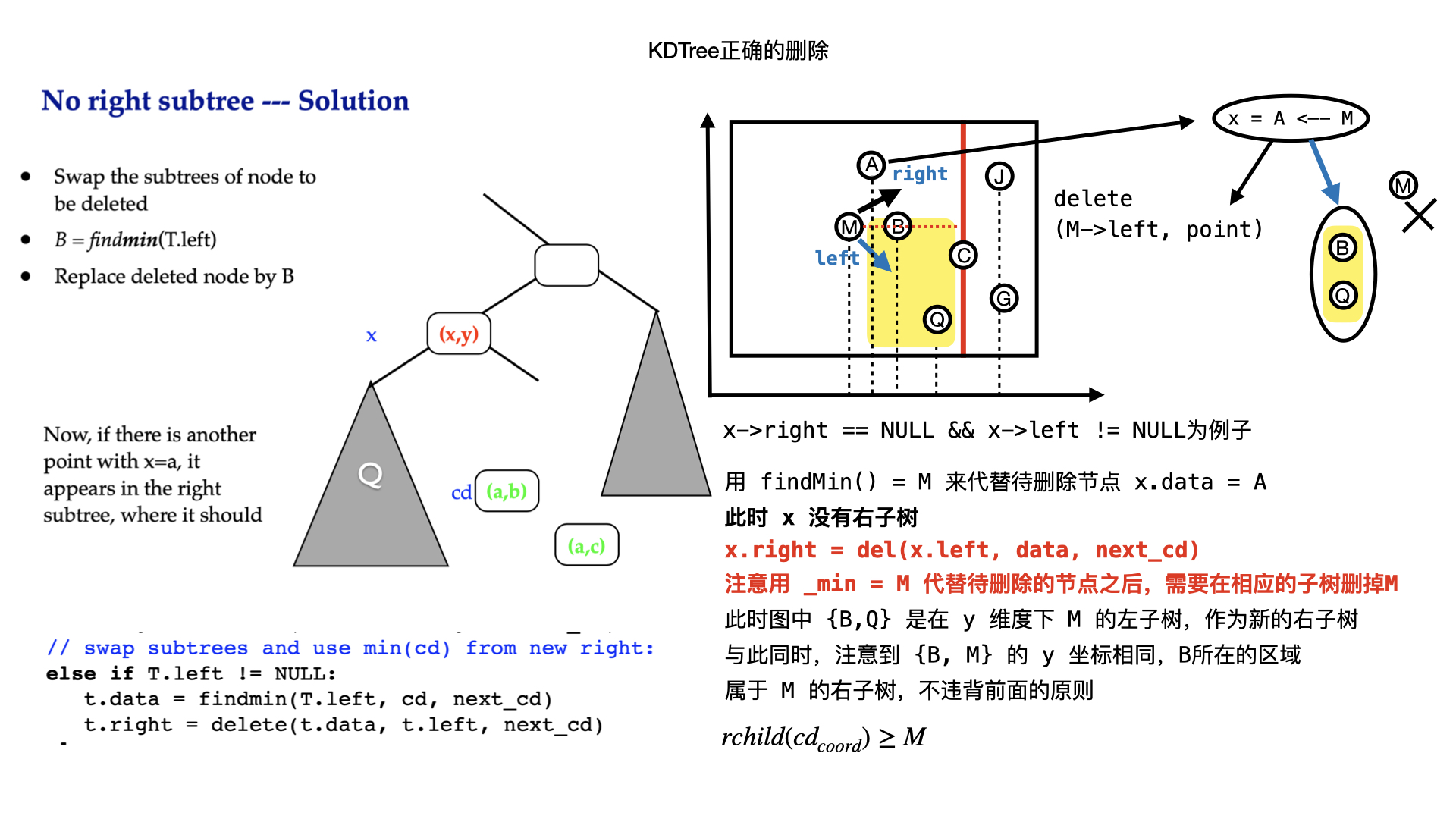
模版
const int maxn = 1e6 + 5;
const int NIL = -1;
// == Point definition ==
class Point {
public:
int id, x, y;
Point() {}
Point(int _id, int _x, int _y) : id(_id), x(_x), y(_y) {}
bool operator< (const Point& rhs) const {
return id < rhs.id;
}
void print() {
printf("%d\n", id);
}
};
Point pt[maxn];
bool cmpx(const Point& p1, const Point& p2) {
return p1.x < p2.x;
}
bool cmpy(const Point& p1, const Point& p2) {
return p1.y < p2.y;
}
// == Point finished ==
// == KDTree structure ==
class Node {
public:
int loc;
int cld[2];
};
inline int sgn(int d) {
return d % 2;
}
Node T[maxn];
int tot = 0, root;
void init() {
tot = 0;
_for(i, 0, maxn) T[i].cld[0] = T[i].cld[1] = NIL;
}
int buildKD(int l, int r, int d) {
if(l >= r) return NIL;
int mid = (l + r) >> 1;
int t = ++tot;
if(sgn(d) == 0) sort(pt + l, pt + r, cmpx);
else sort(pt + l, pt + r, cmpy);
T[t].loc = mid;
T[t].cld[0] = buildKD(l, mid, d + 1);
T[t].cld[1] = buildKD(mid + 1, r, d + 1);
return t;
}
// == KDTree finished ==
// == query ==
void query(int u, int sx, int tx, int sy, int ty, int d, vector<Point>& ans) {
int x = pt[T[u].loc].x;
int y = pt[T[u].loc].y;
if(sx <= x && x <= tx && sy <= y && y <= ty) ans.push_back(pt[T[u].loc]);
if(sgn(d) == 0) {
if(T[u].cld[0] != NIL) {
if(sx <= x) query(T[u].cld[0], sx, tx, sy, ty, d + 1, ans);
}
if(T[u].cld[1] != NIL) {
if(x <= tx) query(T[u].cld[1], sx, tx, sy, ty, d + 1, ans);
}
}
else {
if(T[u].cld[0] != NIL) {
if(sy <= y) query(T[u].cld[0], sx, tx, sy, ty, d + 1, ans);
}
if(T[u].cld[1] != NIL) {
if(y <= ty) query(T[u].cld[1], sx, tx, sy, ty, d + 1, ans);
}
}
}
// == query finsihed ==
int N = 0;
int main() {
freopen("input.txt", "r", stdin);
int x, y;
scanf("%d", &N);
_for(i, 0, N) {
scanf("%d%d", &x, &y);
pt[i] = Point(i, x, y);
}
init();
root = buildKD(0, N, 0);
int q;
scanf("%d", &q);
int sx, tx, sy, ty;
vector<Point> ans;
_for(i, 0, q) {
scanf("%d%d%d%d", &sx, &tx, &sy, &ty);
ans.clear();
query(root, sx, tx, sy, ty, 0, ans);
sort(ans.begin(), ans.end());
_for(k, 0, ans.size()) ans[k].print();
puts("");
}
}
KDTree 插入和删除
注意,kdtree一般的插入或者删除会破坏平衡性
所以一般情况,我们不用插入或者删除
而是采用重新构建kdtree的方法
const int K = 2;
const int inf = 0x3f3f3f3f;
// == tree definition ==
class Node {
public:
int point[K];
Node *cld[2];
};
typedef Node* T;
T create(const int arr[]) {
T cur = new Node();
_for(i, 0, K) cur->point[i] = arr[i];
cur->cld[0] = cur->cld[1] = NULL;
return cur;
}
// == tree finished ==
// == insert function ==
T insertRec(T u, const int point[], int dep) {
if(u == NULL) return create(point);
int cd = dep % K;
if(point[cd] < u->point[cd]) u->cld[0] = insertRec(u->cld[0], point, dep + 1);
else u->cld[1] = insertRec(u->cld[1], point, dep + 1);
return u;
}
T insert(T u, const int point[]) {
return insertRec(u, point, 0);
}
// == insert finished ==
// == search rectangle ==
bool equalPoint(const int point1[], const int point2[]) {
_for(i, 0, K) if(point1[i] != point2[i]) return false;
return true;
}
bool searchRec(T u, const int point[], int dep) {
if(u == NULL) return false;
if(equalPoint(u->point, point)) return true;
int cd = dep % K;
if(point[cd] < u->point[cd]) return searchRec(u->cld[0], point, dep + 1);
return searchRec(u->cld[1], point, dep + 1);
}
bool search(T u, const int point[]) {
return searchRec(u, point, 0);
}
// == search finished ==
// == find min rec ==
T findMinRec(T u, int _cd, int dep) {
if(u == NULL) return NULL;
int cd = dep % K;
if(cd == _cd) {
if(u->cld[0] == NULL) return u;
return findMinRec(u->cld[0], _cd, dep + 1);
}
T left = findMinRec(u->cld[0], _cd, dep + 1);
T right = findMinRec(u->cld[1], _cd, dep + 1);
T cur = left->point[_cd] < right->point[_cd] ? left : right;
return cur->point[_cd] < u->point[_cd] ? cur : u;
}
T findMin(T u, int _cd) {
return findMinRec(u, _cd, 0);
}
// == find finished ==
// == delete node ==
void copyPoint(int to[], const int point[]) {
_for(i, 0, K) to[i] = point[i];
}
T delRec(T u, const int point[], int dep) {
if(u == NULL) return NULL;
int cd = dep % K;
// it is the point to be deleted
if(equalPoint(u->point, point)) {
if(u->cld[1]) {
T _min = findMin(u->cld[1], cd);
copyPoint(u->point, _min->point);
u->cld[1] = delRec(u->cld[1], _min->point, dep + 1);
}
else if(u->cld[0]) {
T _min = findMin(u->cld[0], cd);
copyPoint(u->point, _min->point);
u->cld[1] = delRec(u->cld[0], _min->point, dep + 1);
}
else {
// is leaf node
delete u;
return NULL;
}
return u;
}
if(point[cd] < u->point[cd]) u->cld[0] = delRec(u->cld[0], point, dep + 1);
else u->cld[1] = delRec(u->cld[1], point, dep + 1);
return u;
}
T del(T u, const int point[]) {
return delRec(u, point, 0);
}
// == delete finished ==
int n;
int main() {
T root = NULL;
int points[][K] = {
{3,6}, {17, 15}, {13, 15}, {6, 12},
{9, 1}, {2, 7}, {10, 19}
};
n = sizeof(points) / sizeof(points[0]);
_for(i, 0, n) root = insert(root, points[i]);
int p1[] = {10, 19};
search(root, p1) ? printf("Found\n") : printf("Not found\n");
int p2[] = {12, 19};
search(root, p2) ? printf("Found\n") : printf("Not found\n");
int p3[] = {10, 19};
int p4[] = {9, 1};
del(root, p3);
search(root, p3) ? printf("Found\n") : printf("Not found\n");
search(root, p4) ? printf("Found\n") : printf("Not found\n");
}
KDTree 找 K 近邻
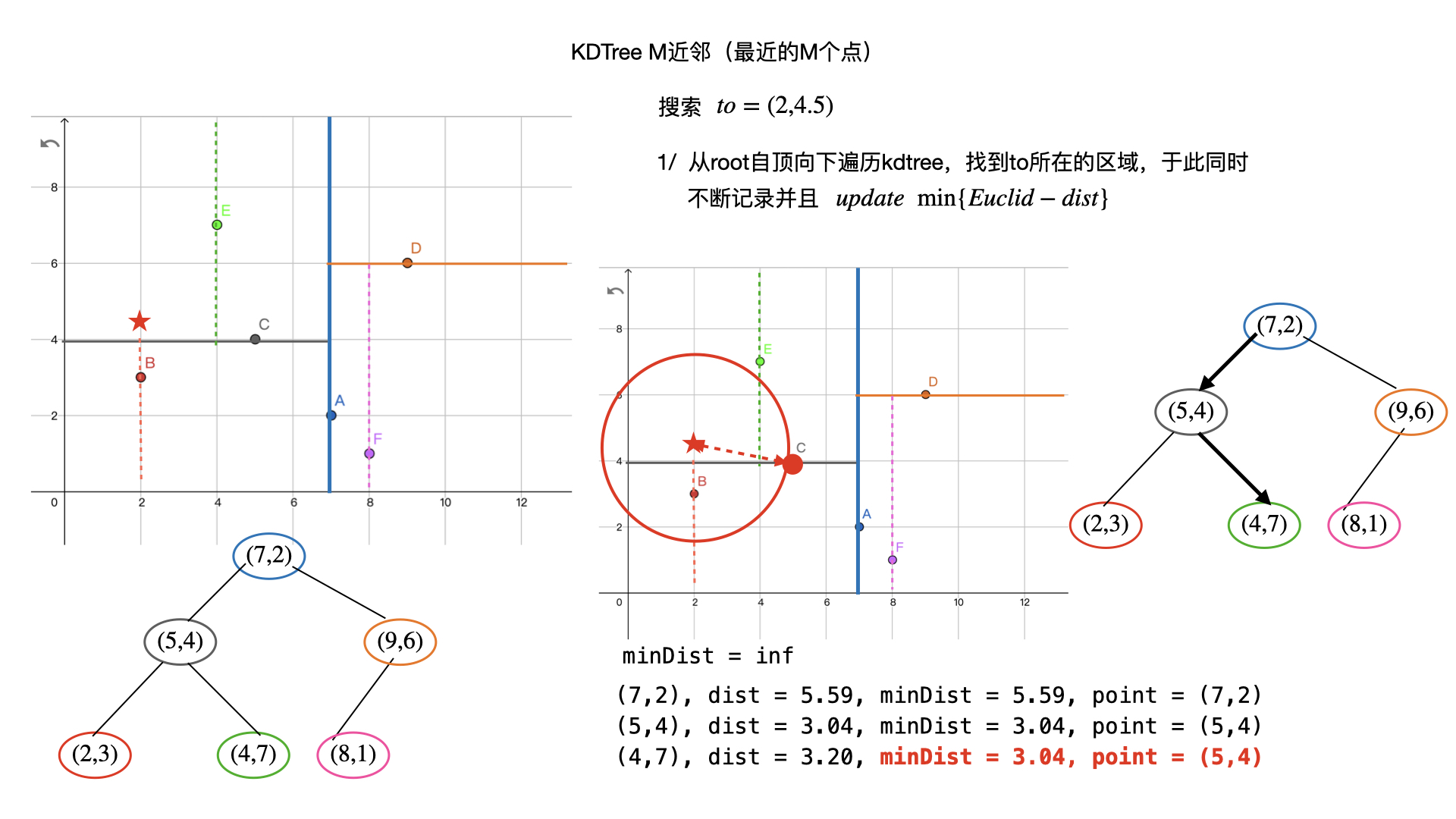
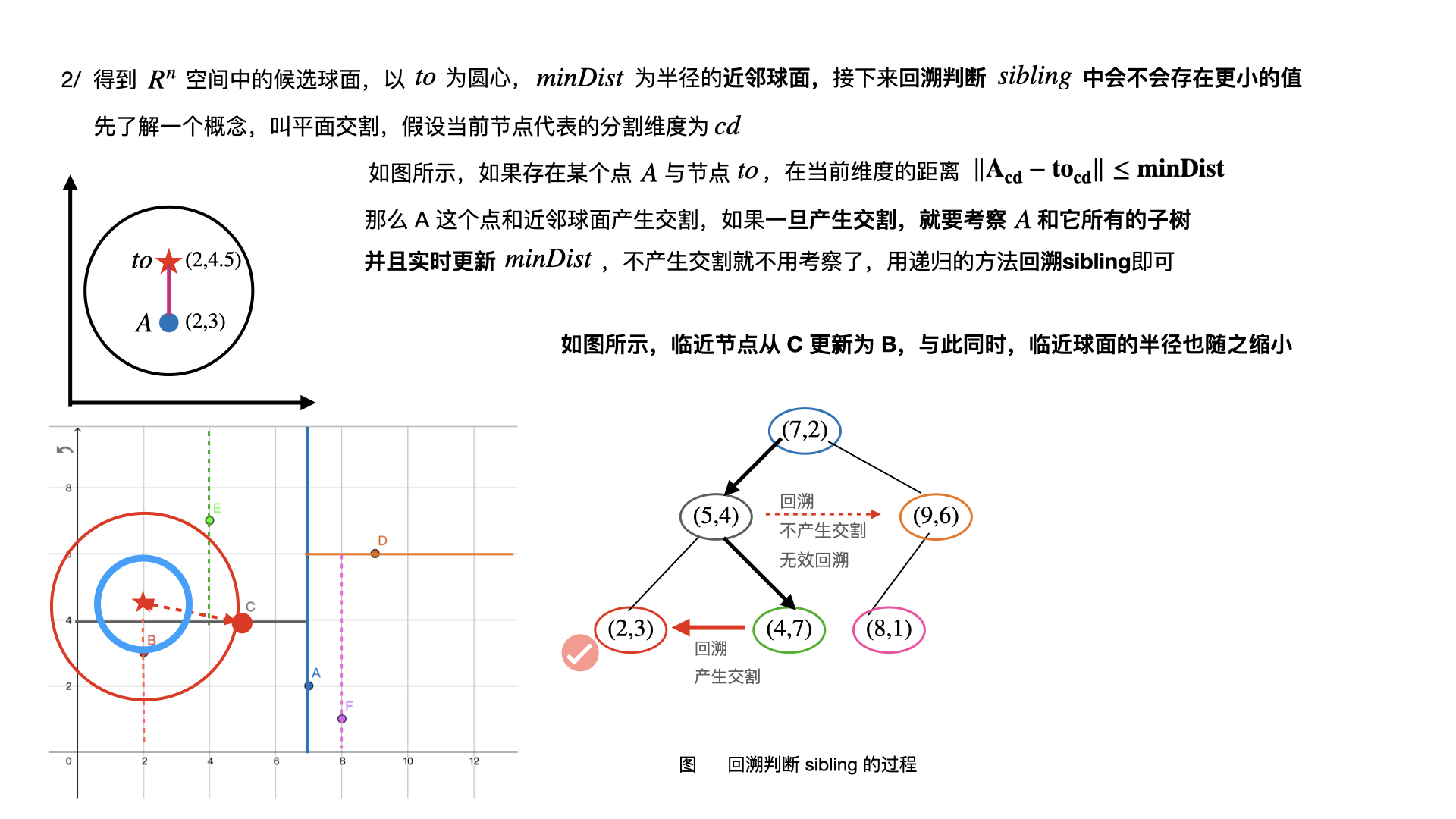
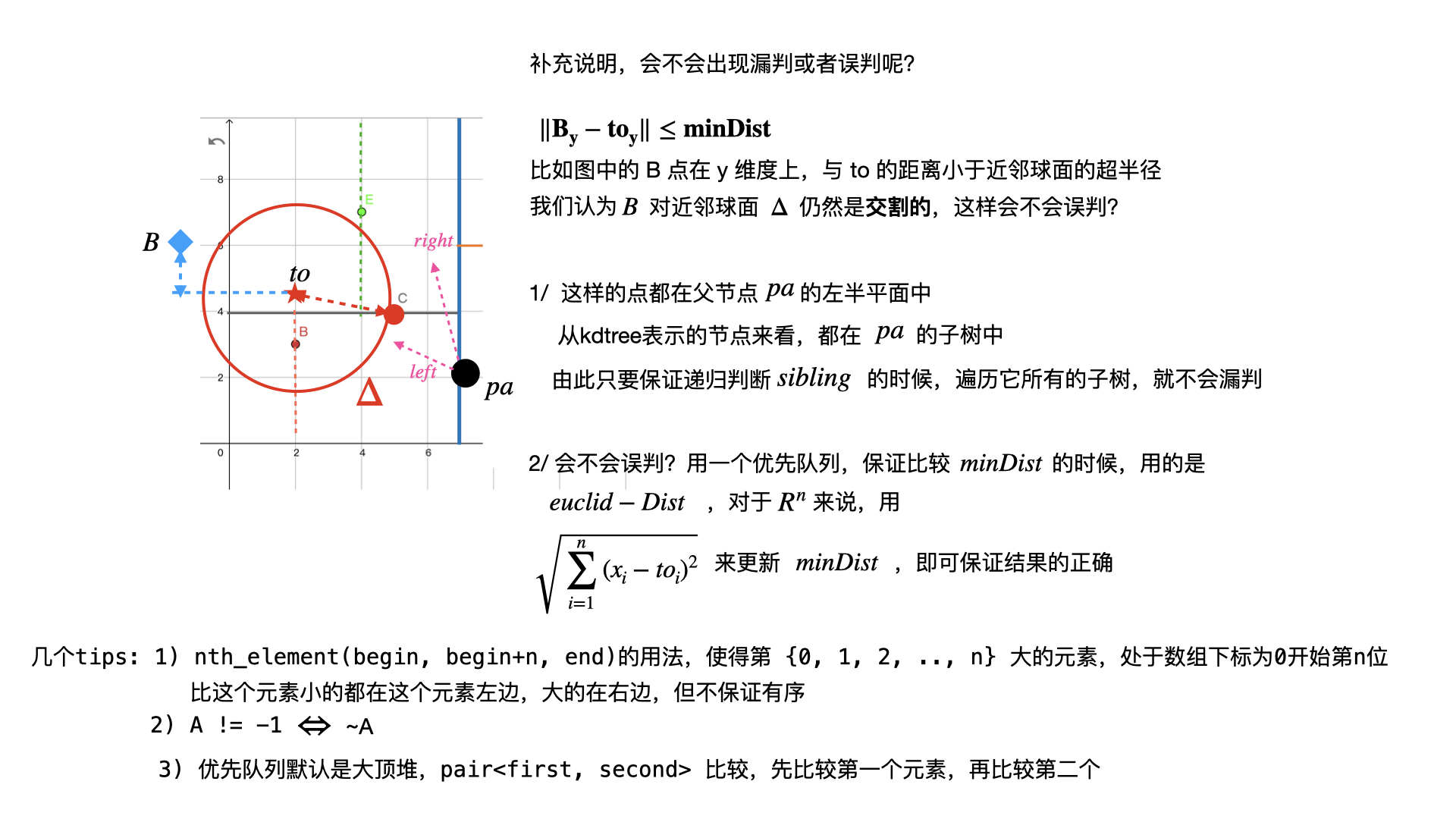
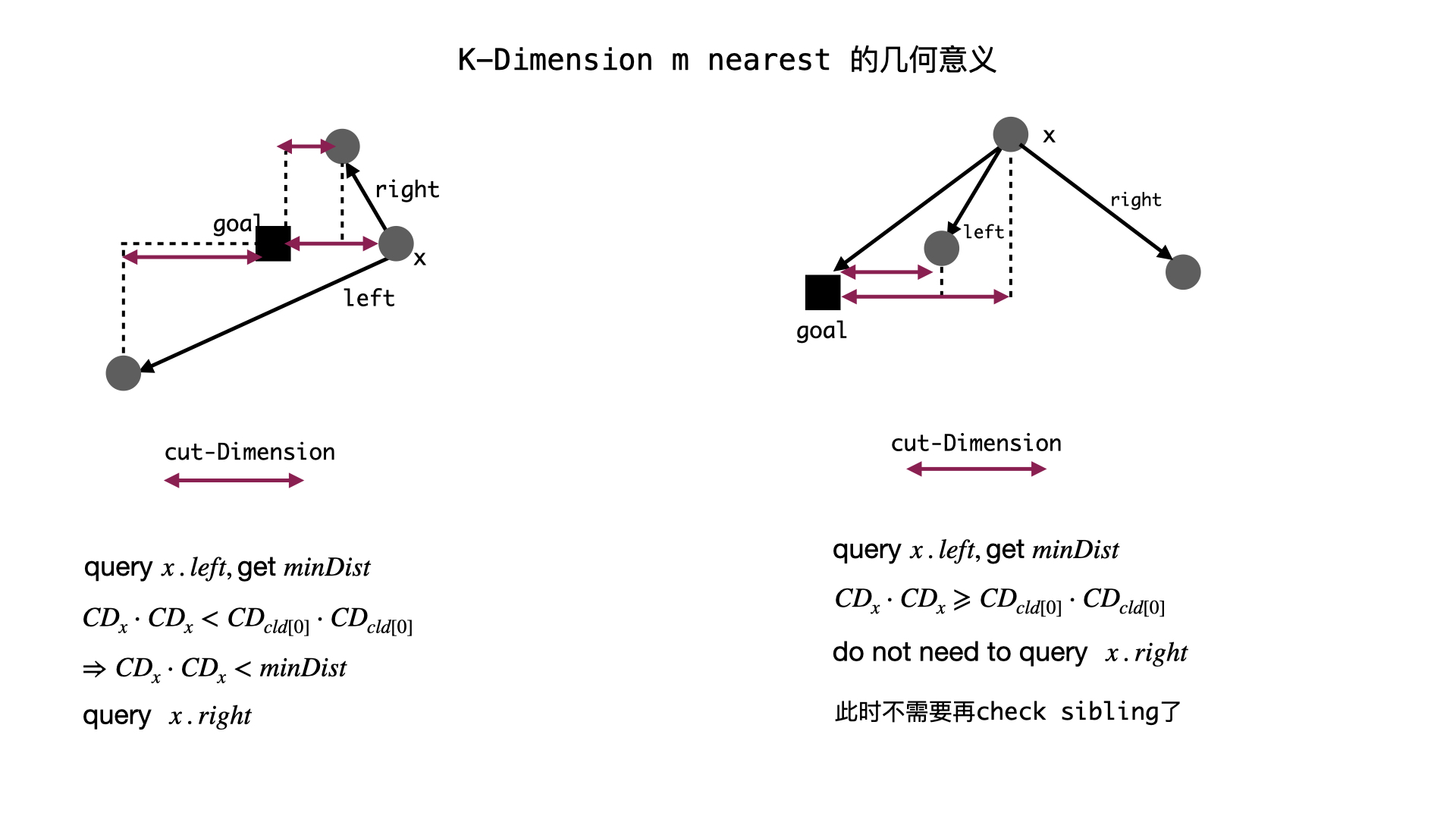
const int maxn = (5e4 + 10) * 2;
const int NIL = 0;
const int inf = 0x3f3f3f3f;
// == KDTree Node definition ==
int cd, K;
class Node {
public:
int x[6], cld[2];
ll _max[6], _min[6];
bool operator< (const Node& rhs) const {
if(x[cd] != rhs.x[cd]) return x[cd] < rhs.x[cd];
_rep(i, cd + 1, K) if(x[i] != rhs.x[i]) return x[i] < rhs.x[i];
_for(i, 1, cd) if(x[i] != rhs.x[i]) return x[i] < rhs.x[i];
return x[cd] < rhs.x[cd];
}
};
Node T[maxn];
inline void pushup(int x, int y) {
_rep(i, 1, K) {
T[x]._max[i] = max(T[x]._max[i], T[y]._max[i]);
T[x]._min[i] = min(T[x]._min[i], T[y]._min[i]);
}
}
int build(int l, int r, int dep) {
if(l > r) return 0;
int mid = (l + r) >> 1;
cd = dep % K;
nth_element(T + l, T + mid, T + r + 1);
_rep(i, 1, K) T[mid]._min[i] = T[mid]._max[i] = T[mid].x[i];
T[mid].cld[0] = T[mid].cld[1] = NIL;
if(l < mid) {
T[mid].cld[0] = build(l, mid - 1, dep + 1);
pushup(mid, T[mid].cld[0]);
}
if(r > mid) {
T[mid].cld[1] = build(mid + 1, r, dep + 1);
pushup(mid, T[mid].cld[1]);
}
return mid;
}
int rt;
// == KDTree finished ==
int n, m, q;
// == temp node for update ==
typedef pair<ll, Node> PLN;
priority_queue<PLN> que;
ll euclid(const Node& a, const Node& b) {
ll ans = 0;
_rep(i, 1, K) ans += 1ll * (a.x[i] - b.x[i]) * (a.x[i] - b.x[i]);
return ans;
}
// == temp node finsihed ==
// == k closest query ==
Node goal;
void query(int u, int dep) {
if(!u) return;
ll res = euclid(T[u], goal);
if(res < que.top().first) {
que.pop();
PLN cur(res, T[u]);
que.push(cur);
}
int cd = dep % K;
ll cut = T[u].x[cd] - goal.x[cd];
if(cut > 0) {
query(T[u].cld[0], dep + 1);
if(cut*cut < que.top().first) query(T[u].cld[1], dep + 1);
}
else {
query(T[u].cld[1], dep + 1);
if(cut*cut < que.top().first) query(T[u].cld[0], dep + 1);
}
}
// == k closest query finsiehd ==
void init() {
_rep(i, 1, K) T[0]._max[i] = -inf, T[0]._min[i] = inf;
}
int main() {
freopen("input.txt", "r", stdin);
while (~scanf("%d%d", &n, &K)) {
init();
_rep(i, 1, n) _rep(j, 1, K) scanf("%d", &T[i].x[j]);
// build KDTree and use KDTree
rt = build(1, n, 1);
// finished
scanf("%d", &q);
while (q--) {
_rep(i, 1, K) scanf("%d", &goal.x[i]);
scanf("%d", &m);
PLN _NIL(inf, Node());
_rep(i, 1, m) que.push(_NIL);
// query closest m points
query(rt, 1);
stack<PLN> stk;
while (!que.empty()) {
stk.push(que.top());
que.pop();
}
printf("the closest %d points are:\n", m);
while (!stk.empty()) {
PLN ans = stk.top();
stk.pop();
_rep(i, 1, K) {
printf("%d", ans.second.x[i]);
i != K ? printf(" ") : printf("\n");
}
}
}
}
}
const int maxn = (200000 + 5) * 2;
const ll inf = 0x3f3f3f3f3f3f3f3f;
const int NIL = 0;
// == KDTree definition ==
int cd, K = 2;
class Node {
public:
int x[2], cld[2];
int cost, id;
bool operator< (const Node& rhs) const {
return x[cd] < rhs.x[cd];
}
} T[maxn];
int rt;
// usage, build(1, n, 0)
int build(int l, int r, int dep) {
if(l > r) return 0;
int mid = (l + r) >> 1;
cd = dep % K;
nth_element(T+l, T+mid, T+r+1);
T[mid].cld[0] = T[mid].cld[1] = NIL;
if(l < mid) T[mid].cld[0] = build(l, mid - 1, dep + 1);
if(r > mid) T[mid].cld[1] = build(mid + 1, r, dep + 1);
return mid;
}
// == KDTree definition finsished ==
// == ans used for update ==
ll euclid(const Node& a, const Node& b) {
ll ans = 0;
_for(i, 0, K) ans += 1ll * (a.x[i] - b.x[i]) * (a.x[i] - b.x[i]);
return ans;
}
bool valid(const Node& cur, const Node& goal) {
return cur.cost <= goal.cost;
}
typedef pair<ll, Node> PLN;
PLN ans;
// == ans finsihed ==
// == query ==
void query(int u, const Node& goal, int dep) {
if(!u) return;
ll res = euclid(T[u], goal);
if(res == ans.first && T[u].id < ans.second.id && valid(T[u], goal)) {
PLN cur(res, T[u]);
ans = cur;
}
if(res < ans.first && valid(T[u], goal)) {
PLN cur(res, T[u]);
ans = cur;
}
int cd = dep % K;
ll cut = T[u].x[cd] - goal.x[cd];
if(cut > 0) {
query(T[u].cld[0], goal, dep + 1);
if(cut*cut < ans.first) query(T[u].cld[1], goal, dep + 1);
}
else {
query(T[u].cld[1], goal, dep + 1);
if(cut*cut < ans.first) query(T[u].cld[0], goal, dep + 1);
}
}
// == query finsihed ==
int n, m;
void init() {
K = 2;
}
int main() {
freopen("input.txt", "r", stdin);
int kase;
scanf("%d", &kase);
while (kase--) {
init();
// == input data ==
scanf("%d%d", &n, &m);
_rep(i, 1, n) {
_for(j, 0, 2) scanf("%d", &T[i].x[j]);
scanf("%d", &T[i].cost);
T[i].id = i;
}
// == input finsihed ==
// == build kdtree ==
rt = build(1, n, 0);
// == build finsihed ==
for(; m; m--) {
Node goal;
_for(j, 0, 2) scanf("%d", &goal.x[j]);
scanf("%d", &goal.cost);
PLN _NIL(inf, Node());
ans = _NIL;
// == query for closest point ==
query(rt, goal, 0);
// == query finsihed ==
_for(i, 0, K) printf("%d ", ans.second.x[i]);
printf("%d\n", ans.second.cost);
}
}
}
KDTree 统计区间点数(莫队)
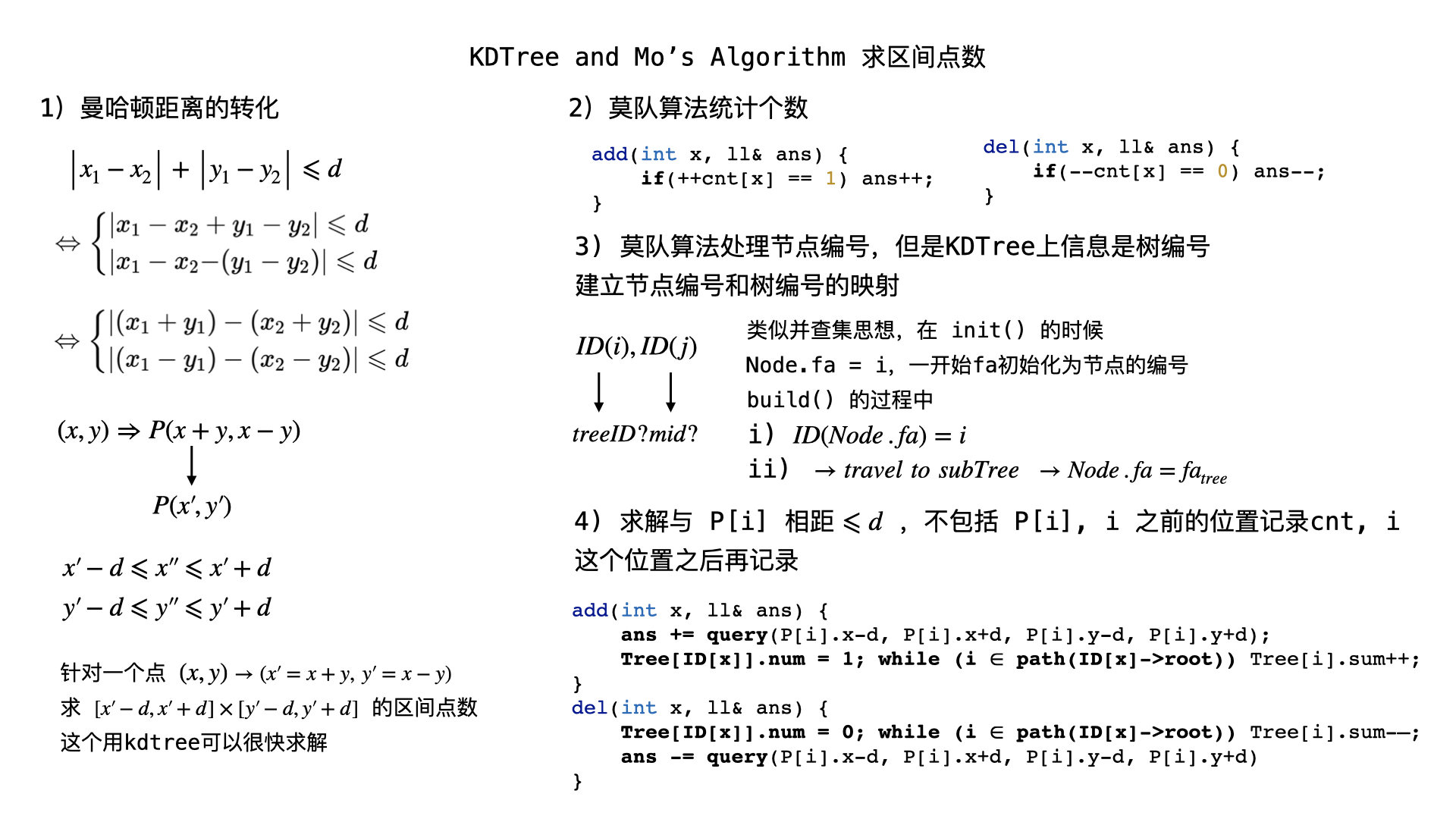
const int maxn = 200000 + 10;
const int NIL = 0;
int n, d, m;
// == Point definition ==
class Point {
public:
int x, y;
} PO[maxn];
// == Point finsihed ==
// == Node definition ==
int ID[maxn];
/* used for mapping ID */
int K = 2, cd;
class KDTree {
public:
int xy[2], xymin[2], xymax[2];
int cld[2];
int sum, fa, num;
bool operator< (const KDTree& rhs) const {
return xy[cd] < rhs.xy[cd];
}
inline void update();
inline void _init(int i);
} T[maxn];
inline void KDTree::_init(int i) {
ID[fa] = i;
_for(j, 0, K) xymax[j] = xymin[j] = xy[j];
num = sum = 0;
cld[0] = cld[1] = NIL;
}
inline void KDTree::update() {
_for(i, 0, K) if(cld[i]) _for(j, 0, K) {
xymin[j] = min(xymin[j], T[cld[i]].xymin[j]);
xymax[j] = max(xymax[j], T[cld[i]].xymax[j]);
}
}
int build(int l, int r, int dep, int _fa) {
if(l > r) return NIL;
int mid = (l + r) >> 1;
cd = dep % K;
nth_element(T + l, T + mid, T + r + 1);
KDTree& cur = T[mid];
//assert(cur.fa != 0);
cur._init(mid);
assert(ID[cur.fa] == mid);
cur.fa = _fa;
if(l < mid) cur.cld[0] = build(l, mid - 1, dep + 1, mid);
if(r > mid) cur.cld[1] = build(mid + 1, r, dep + 1, mid);
cur.update();
return mid;
}
int root;
// == Node definition finished ==
// == KDTree query ==
ll ANS[maxn];
inline bool inRange(int x, int l, int r) {
return l <= x && x <= r;
}
int query(int u, int x1, int x2, int y1, int y2) {
int res = 0;
const KDTree& cur = T[u];
if(cur.xymin[0] > x2 || cur.xymax[0] < x1 || cur.xymin[1] > y2 || cur.xymax[1] < y1 || cur.sum == 0) {
return 0;
}
if(x1 <= cur.xymin[0] && cur.xymax[0] <= x2 && y1 <= cur.xymin[1] && cur.xymax[1] <= y2) {
return cur.sum;
}
if(inRange(cur.xy[0], x1, x2) && inRange(cur.xy[1], y1, y2)) res += cur.num;
_for(i, 0, K) if(cur.cld[i]) {
res += query(cur.cld[i], x1, x2, y1, y2);
}
return res;
}
// == KDTree query finished ==
// == Mo algo ==
int belong[maxn];
int sz, t;
class Qry {
public:
int l, r, id;
} qry[maxn];
void block() {
sz = sqrt(n);
t = n / sz;
_rep(i, 1, t) _rep(k, (i - 1) * sz + 1, i * sz) belong[k] = i;
if(t * sz < n) {
t++;
_rep(k, (t - 1) * sz + 1, n) belong[k] = t;
}
}
bool cmp(const Qry& a, const Qry& b) {
if(belong[a.l] ^ belong[b.l]) return belong[a.l] < belong[b.l];
return a.r < b.r;
}
void add(int pos, ll& ans) {
ans += query(root, PO[pos].x - d, PO[pos].x + d, PO[pos].y - d, PO[pos].y + d);
int ti = ID[pos];
T[ti].num = 1;
while (ti) T[ti].sum++, ti = T[ti].fa;
}
void del(int pos, ll& ans) {
int ti = ID[pos];
T[ti].num = 0;
while (ti) T[ti].sum--, ti = T[ti].fa;
ans -= query(root, PO[pos].x - d, PO[pos].x + d, PO[pos].y - d, PO[pos].y + d);
}
// == Mo algo finished ==
void init() {
Set(ID, 0);
Set(belong, 0);
}
int main() {
freopen("input.txt", "r", stdin);
for(int t = 1, x, y; scanf("%d%d%d", &n, &d, &m) == 3; t++) {
init();
printf("Case %d:\n", t);
// input point data
_rep(i, 1, n) {
KDTree& cur = T[i];
scanf("%d%d", &x, &y);
cur.xy[0] = PO[i].x = x + y;
cur.xy[1] = PO[i].y = x - y;
cur.fa = i;
}
// build tree
root = build(1, n, 0, 0);
// block for Mo algorithm
// remember sort query then Mo algorithm
_rep(i, 1, m) {
scanf("%d%d", &qry[i].l, &qry[i].r);
qry[i].id = i;
}
block();
sort(qry + 1, qry + 1 + m, cmp);
// use Mo algo and KDTree query
int l = 1, r = 0;
ll ans = 0;
_rep(i, 1, m) {
int ql = qry[i].l, qr = qry[i].r;
while (r < qr) add(++r, ans);
while (r > qr) del(r--, ans);
while (l < ql) del(l++, ans);
while (l > ql) add(--l, ans);
ANS[qry[i].id] = ans;
}
_rep(i, 1, m) printf("%lld\n", ANS[i]);
}
}
KDTree 和并查集
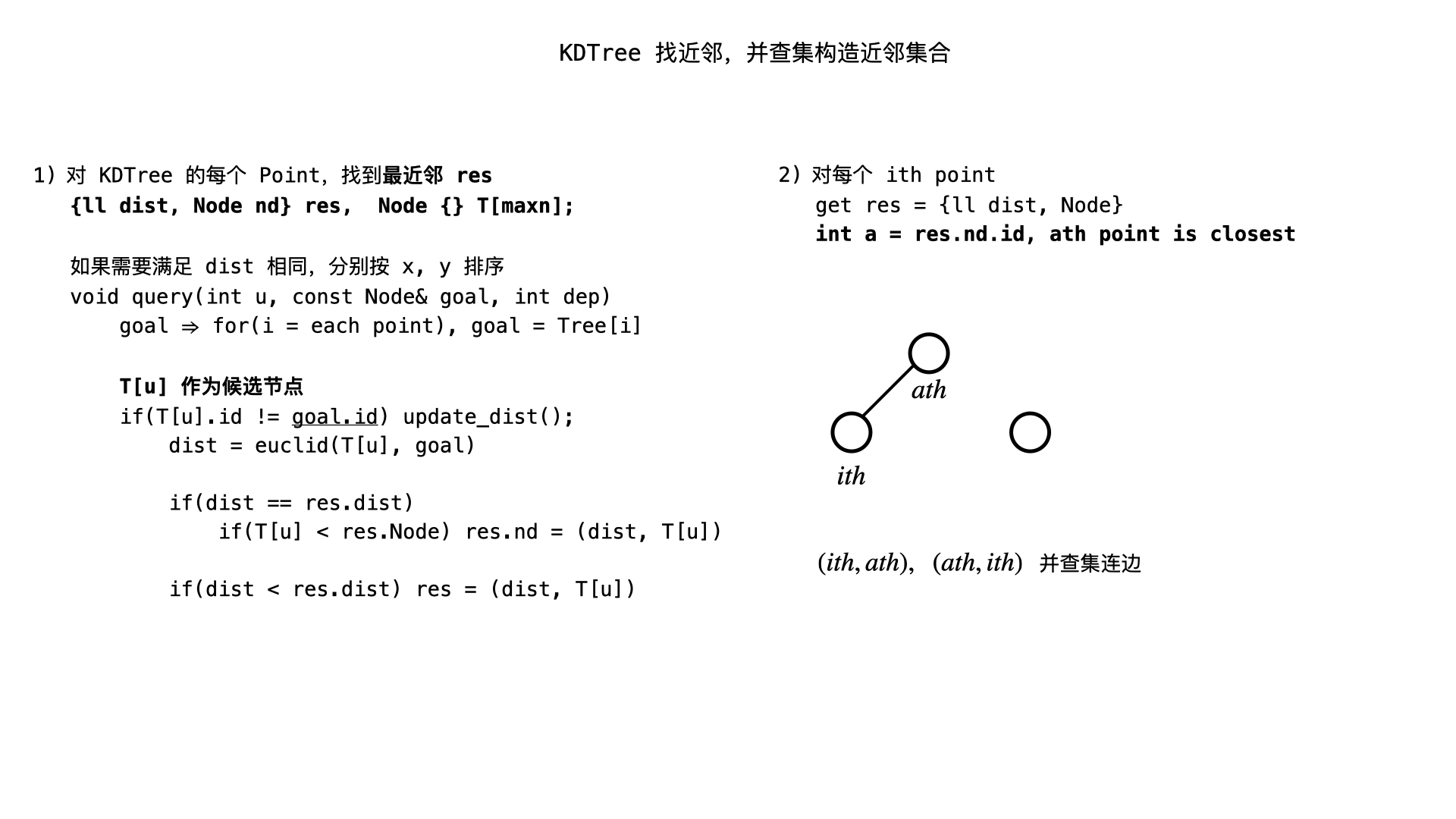
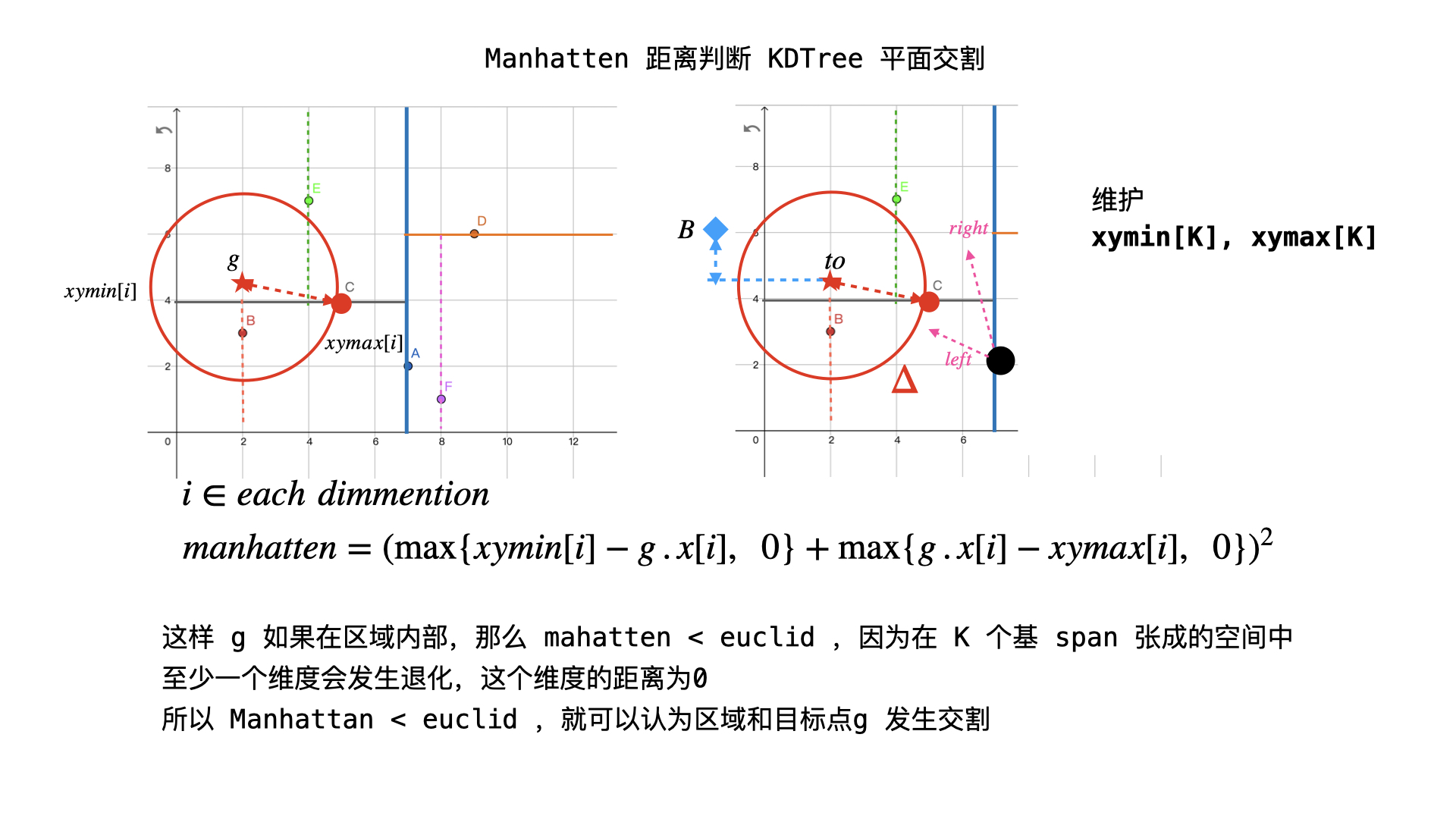
const int maxn = (1e5 + 5) * 2;
const ll inf = 0x3f3f3f3f3f3f3f3f;
const int NIL = 0;
int n, q;
int ID[maxn];
// == KDTree definition ==
int cd, K = 2;
class Node {
public:
ll x[2];
int cld[2];
ll xymax[2], xymin[2];
int id;
bool operator< (const Node& rhs) const {
if(x[0] != rhs.x[0]) return x[0] < rhs.x[0];
return x[1] < rhs.x[1];
}
void _init(int i) {
ID[id] = i;
_for(j, 0, K) xymin[j] = xymax[j] = x[j];
cld[0] = cld[1] = NIL;
}
inline void update();
} Tree[maxn];
inline void Node::update() {
_for(i, 0, K) if(cld[i]) _for(j, 0, K) {
xymin[j] = min(xymin[j], Tree[cld[i]].xymin[j]);
xymax[j] = max(xymax[j], Tree[cld[i]].xymax[j]);
}
}
bool cmp(const Node& a, const Node& b) {
return a.x[cd] < b.x[cd];
}
// Point cur = pt[Tree[u].id]
int root;
// == KDTree finished ==
// == build tree ==
int build(int l, int r, int dep) {
if(l > r) return 0;
int mid = (l + r) >> 1;
cd = dep % K;
nth_element(Tree + l, Tree + mid, Tree + r + 1, cmp);
Tree[mid]._init(mid);
if(l < mid) Tree[mid].cld[0] = build(l, mid - 1, dep + 1);
if(mid < r) Tree[mid].cld[1] = build(mid + 1, r, dep + 1);
Tree[mid].update();
return mid;
}
// == build fisniehd ==
// == used to solve ==
struct A {
ll dist;
Node nd;
A() {};
A(ll d, Node nd) : dist(d), nd(nd) {}
} res;
// dist init to inf
inline ll euclid(const Node& a, const Node& b) {
ll ans = 0;
_for(i, 0, K) ans += 1ll * (a.x[i] - b.x[i]) * (a.x[i] - b.x[i]);
return ans;
}
inline ll manhatten(int u, const Node& goal) {
ll ans = 0;
const Node& cur = Tree[u];
_for(i, 0, K) {
ans += (max(cur.xymin[i] - goal.x[i], 0LL) + max(goal.x[i] - cur.xymax[i], 0LL)) *
(max(cur.xymin[i] - goal.x[i], 0LL) + max(goal.x[i] - cur.xymax[i], 0LL));
}
return ans;
}
void querymin(int u, const Node& goal) {
if(!u) return;
if(goal.id != Tree[u].id) {
ll dist = euclid(goal, Tree[u]);
if(dist == res.dist && Tree[u] < res.nd) {
res.nd = Tree[u];
}
if(dist < res.dist) {
res.dist = dist;
res.nd = Tree[u];
}
}
ll dl = Tree[u].cld[0] ? manhatten(Tree[u].cld[0], goal) : inf;
ll dr = Tree[u].cld[1] ? manhatten(Tree[u].cld[1], goal) : inf;
if(dl < dr) {
if(dl <= res.dist) querymin(Tree[u].cld[0], goal);
if(dr <= res.dist) querymin(Tree[u].cld[1], goal);
}
else {
if(dr <= res.dist) querymin(Tree[u].cld[1], goal);
if(dl <= res.dist) querymin(Tree[u].cld[0], goal);
}
}
// == finsihed ==
// == findset definition ==
int pa[maxn];
int findset(int x) {
return pa[x] == x ? x : pa[x] = findset(pa[x]);
}
// == findset finsihed ==
// == solve the problem ==
void fi(int i) {
res = A(inf, Node());
querymin(root, Tree[ID[i]]);
int to = res.nd.id;
int u = findset(i);
int v = findset(to);
//printf("#: %d, %d, %d, %d\n", i, to, u, v);
if(u != v) pa[u] = v;
}
// == solve finished ==
void init() {
//
K = 2;
res = A(inf, Node());
Set(ID, 0);
_for(i, 0, maxn) pa[i] = i;
}
int main() {
freopen("input.txt", "r", stdin);
int kase;
scanf("%d", &kase);
for(int _ = 1; _ <= kase; _++) {
printf("Case #%d:\n", _);
init();
scanf("%d%d", &n, &q);
_rep(i, 1, n) {
scanf("%lld%lld", &Tree[i].x[0], &Tree[i].x[1]);
Tree[i].id = i;
}
// build KDTree
root = build(1, n, 0);
//_rep(i, 1, n) debug(ID[i]);
// query min dist
_rep(i, 1, n) fi(i);
// debug
_rep(i, 1, q) {
int x, y;
scanf("%d%d", &x, &y);
findset(x) == findset(y) ? puts("YES") : puts("NO");
}
}
}
KDTree 剪枝优化
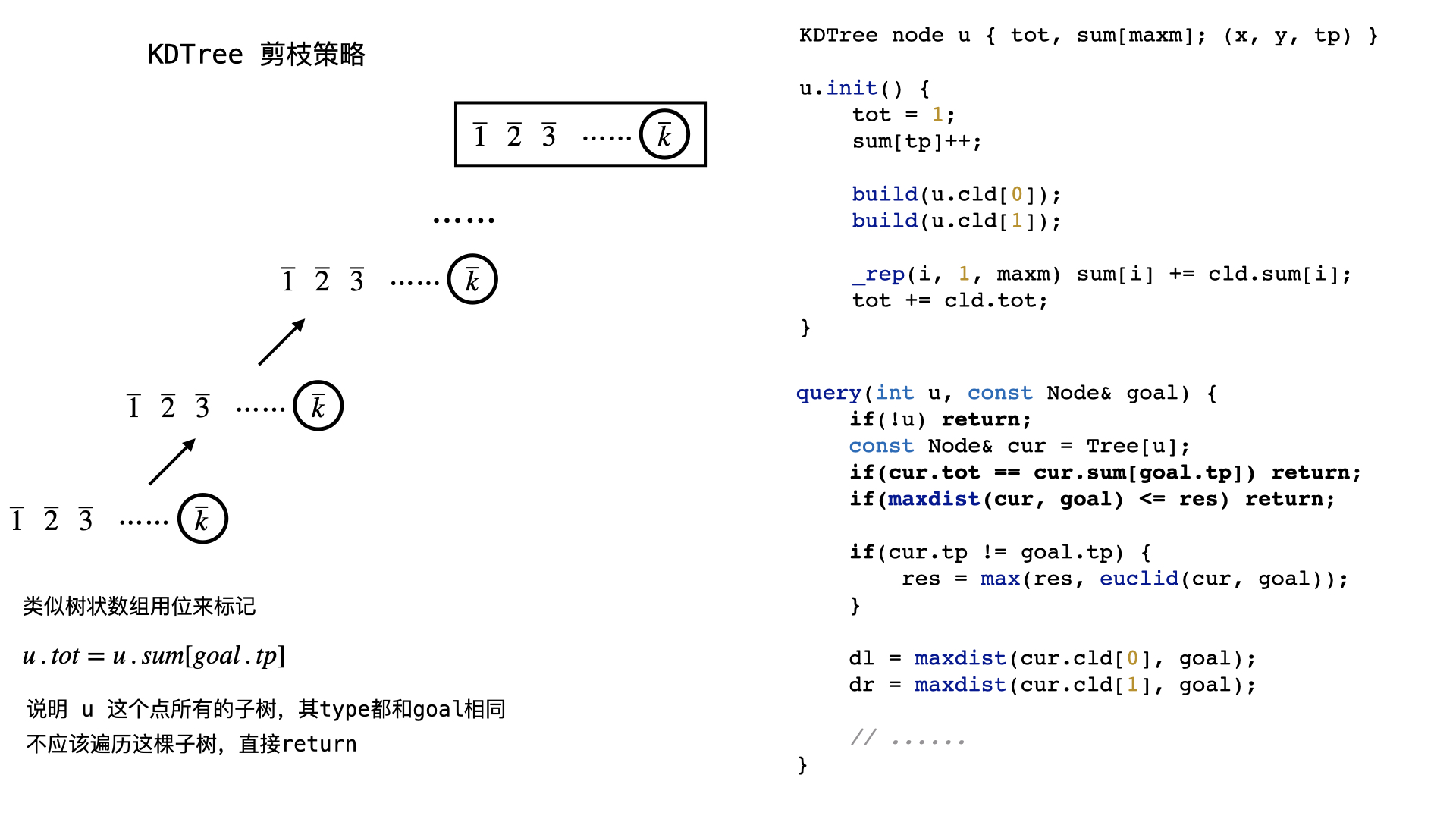
const int inf = 0x3f3f3f3f;
const int maxn = 1e5 + 5;
const int maxm = 100 + 5;
int n;
// == KDTree definition ==
int cd = 0;
const int K = 2;
struct Base {
int x[2];
int tp;
} sta[maxn];
class Node {
public:
Node *cld[2];
int xy[2];
int tp;
int tot;
int sum[maxm];
int x1, x2, y1, y2;
void border(int L, int R, int& _x1, int& _x2, int& _y1, int& _y2) {
_rep(i, L, R) {
Base& cur = sta[i];
_x1 = min(_x1, cur.x[0]);
_x2 = max(_x2, cur.x[0]);
_y1 = min(_y1, cur.x[1]);
_y2 = max(_y2, cur.x[1]);
}
}
inline void _init(int _tp = 0, int _x1 = 0, int _x2 = 0, int _y1 = 0, int _y2 = 0) {
tot = 0;
Set(sum, 0);
cld[0] = cld[1] = NULL;
x1 = _x1; x2 = _x2; y1 = _y1; y2 = _y2;
tp = _tp;
}
inline void getData(int tid) {
const Base& _cur = sta[tid];
_for(i, 0, K) xy[i] = _cur.x[i];
sum[_cur.tp]++;
tot = 1;
}
void update();
} memory[maxn * 2];
typedef Node* T;
Node *mem = memory;
Node *root;
void Node::update() {
_for(i, 0, K) if(cld[i]) {
_for(j, 0, maxm) sum[j] += cld[i]->sum[j];
tot += cld[i]->tot;
}
}
// == KDTree finished ==
// == build KDTree ==
inline bool cmp(const Base& a, const Base& b) {
return a.x[cd] < b.x[cd];
}
void build(T& cur, int l, int r, int dep) {
if(l > r) return;
cur = ++mem;
int _x1, _x2, _y1, _y2;
_x1 = _y1 = inf;
_x2 = _y2 = 0;
cur->border(l, r, _x1, _x2, _y1, _y2);
//assert(dbg(cur) != 0);
//debug(dbg(cur));
cd = dep % K;
int mid = (l + r) >> 1;
nth_element(sta + l, sta + mid, sta + r + 1, cmp);
cur->_init(sta[mid].tp, _x1, _x2, _y1, _y2);
cur->getData(mid);
build(cur->cld[0], l, mid - 1, dep + 1);
build(cur->cld[1], mid + 1, r, dep + 1);
cur->update();
}
// == build KDTree finished ==
// == used for calculate ==
inline int sqr(int x) {
return x * x;
}
inline int maxdist(T cur, const Base& goal) {
if(!cur) return 0;
int ans = sqr(cur->x1 - goal.x[0]) + sqr(cur->y1 - goal.x[1]);
ans = max(ans, sqr(cur->x1 - goal.x[0]) + sqr(cur->y2 - goal.x[1]));
ans = max(ans, sqr(cur->x2 - goal.x[0]) + sqr(cur->y1 - goal.x[1]));
ans = max(ans, sqr(cur->x2 - goal.x[0]) + sqr(cur->y2 - goal.x[1]));
return ans;
}
inline int euclid(T cur, const Base& goal) {
return sqr(cur->xy[0] - goal.x[0]) + sqr(cur->xy[1] - goal.x[1]);
}
void query(const T &cur, const Base& goal, int& res) {
if(!cur) return;
if(cur->tot == cur->sum[goal.tp]) return;
if(maxdist(cur, goal) <= res) return;
if(cur->tp != goal.tp) {
res = max(res, euclid(cur, goal));
}
int d[2], flag = 1;
d[0] = maxdist(cur->cld[0], goal);
d[1] = maxdist(cur->cld[1], goal);
if(d[0] > d[1]) flag ^= 1;
if(d[flag] > res) query(cur->cld[flag], goal, res);
if(d[flag^1] > res) query(cur->cld[flag^1], goal, res);
}
void solve() {
int ans = 0;
_rep(i, 1, n) query(root, sta[i], ans);
printf("%d\n", ans);
}
// == calculate finsihed ==
void init() {
_for(i, 0, maxn) (memory + i)->_init();
mem = memory;
root = NULL;
}
int main() {
freopen("input.txt", "r", stdin);
while (scanf("%d", &n) == 1 && n) {
// input sta data
_rep(i, 1, n) {
Base& cur = sta[i];
scanf("%d%d%d", &cur.x[0], &cur.x[1], &cur.tp);
}
init();
// build KDTree
build(root, 1, n, 0);
// solve
solve();
}
}


你这图是怎么画出来的,呀太强了把
你这也tql吧
爱辽爱辽
tql,大佬是高中生?
申请转载
(蹭大佬仙气)欢迎转载
谢谢大佬QwQ 话说您现在用得了UVA和LA?我交了两题都submited failedQAQ
我昨天ac的啊
应该是可以用的,你去 https://vjudge.net/problem/UVALive-7825
好了谢谢大佬QwQ(之前LA有段时间一直交不上去,然后都用UVA测了,结果现在UVA咕了换LA去了QAQ)
超详细!!!爱了爱了
(进我收藏列表吃灰吧%%%